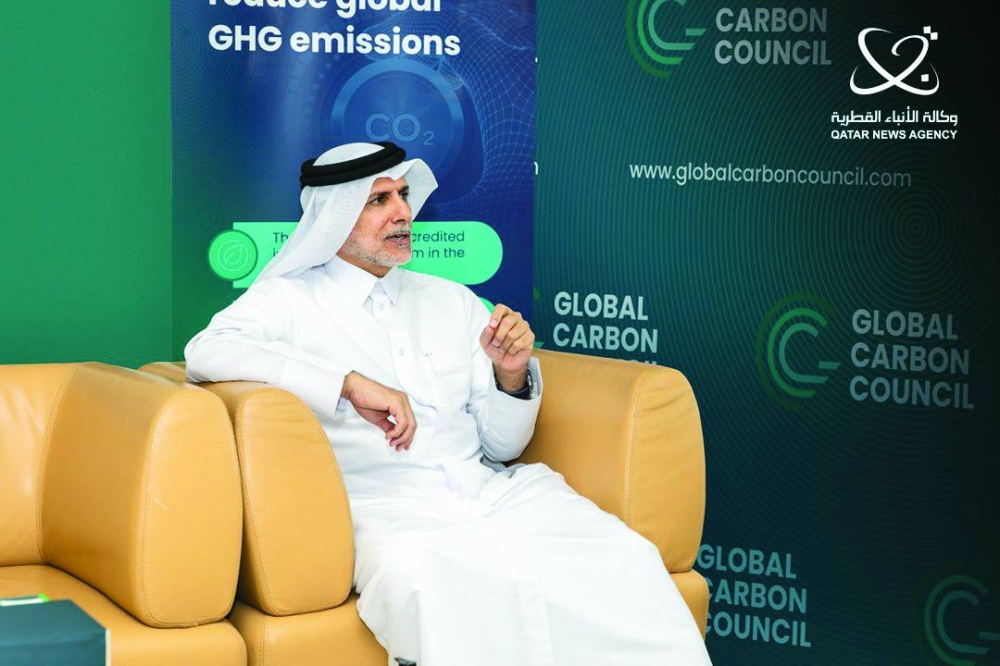
Dr Yousef bin Mohamed al-Horr, Chairman of the Global Carbon Council.
Chairman of the Global Carbon Council Dr Yousef bin Mohamed al-Horr said that transitioning to a low-carbon economy is a challenge that calls for international co-operation involving the public and private sectors to address the problem of climate change, which requires the concerted efforts of governments, organisations, and individuals alike.
This came in a statement to Qatar News Agency (QNA) commenting on the ongoing discussion in that regard and including the goal of "transitioning to a low-carbon economy" among the topics discussed by the Qatar Economic Forum during its third edition.
The carbon footprint expert al-Horr indicated that the principle of common but differentiated responsibilities and respective capabilities has been agreed and that governs the global climate actions. It includes an acceptance that we should be able to collaborate across borders and industries in catalysing climate actions, and that we should engage with all sectors of society.
He stressed that this co-operation enables governments and private sector actors to do more, earlier and faster than what they could achieve individually. The collaboration between countries is on capacity building, technology transfer, and international climate finance. One of the key sources of international finance is the "carbon markets" under Article 6 of the Paris Agreement.
Al-Horr added that over the past years, carbon markets have gained momentum as a powerful tool for facing climate challenges by linking financial incentives to environmentally friendly initiatives, and their role in stimulating positive innovation and investment in clean technologies. At the same time, carbon markets give a price index to institutions to take responsibility and contribute to reducing their emissions.
He pointed out that independent GHG standard bodies have a very important role in this. Global Carbon Council (GCC) is playing its part by operation of the global GHG Program approved under the scheme referred as "Carbon Offsetting and Reduction for International Aviation (CORSIA)" of International Civil Aviation Organisation (ICAO) and International Carbon Reduction and Offsetting Alliance (ICROA).
He noted that GCC has already received 1,485 GHG reduction projects from approximately 45 countries in the last two years which will reduce about 2bn tonnes of CO2 equivalent emissions in ten years time. This means that GCC will issue approximately 2bn carbon credits in the next seven to 10 years.
He said that the GCCs role is to create market instrument that can be used to raise international climate finance. GCC is engaging with several countries to facilitate climate actions under Article 6.2 of the Paris Agreement, by facilitating cooperative approaches for use of carbon markets with a central role of GCC as a GHG standard.
Qatar has several strengths and enablers that would allow it to play a vital role on a global level. Apart from the financial abilities, the Qatar-based Global Carbon Council (GCC) supports governments in implementing and operationalising Article 6.2 and private sector project owners in receiving revenues for the carbon credits generated from GHG emission reduction projects.
Al-Horr said, "Qatar, therefore, can play a pivotal role in capacity building for the global players and countries and can encourage co-operative approaches under Article 6.2 between countries to help them raise international finance to support each other's nationally determined contributions (NDCs)."
He added that despite the global trends that promote carbon markets as a major catalyst for achieving the goals of the Paris Agreement, their polarisation in the Middle East and North Africa region was relatively slow, so the GCC launched the first voluntary carbon market in the region, and it is now the only voluntary carbon market. outside first-world countries, to bridge this gap.
He pointed out that GCC is playing its part by operating the global GHG Program approved under the scheme referred to as "Carbon Offsetting and Reduction for International Aviation (CORSIA)" of the International Civil Aviation Organisation (ICAO) and International Carbon Reduction and Offsetting Alliance (ICROA). He explained that the programme deals with carbon offsets benefiting a wide range of greenhouse gas reduction projects including those launched in the Gulf and Mena region.
After the UN Climate Change Conference (COP27) in Egypt reached a breakthrough agreement to provide "loss and damage" funding — funded by industrialised countries — for vulnerable countries hit hard by climate disasters, he explained that the fund is a pivotal step toward a world without carbon emissions, adding that the harmful effects of global warming are not evenly distributed as the countries that caused the least amount of damage are the most vulnerable to natural disasters. He underlined that the world leaders achieved a historic decision in COP27 by establishing a fund to compensate for the losses and damages suffered by poor countries to provide climate justice for all in need.
